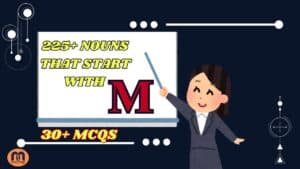Verbs That Start with K: Verbs are the heart of every sentence, infusing energy and action into our communication.
Whether you’re writing an essay, engaging in a conversation, or enhancing your vocabulary for professional growth, knowing a wide variety of verbs can make your expression more powerful and dynamic.
Today, we’re exploring an interesting subset: verbs that start with the letter K. Though the letter “K” may seem tricky when it comes to verbs, there are actually plenty of action words to discover that can elevate your language.
In this guide, we’ll explore over 505+ verbs that start with K, helping you expand your vocabulary, improve your writing, and express yourself more vividly.
Let’s dive in and explore how these verbs can enrich your language.
Why Verbs Matter
Before we get into the specific verbs, it’s helpful to understand why verbs are so essential. Verbs are action words that describe what someone or something is doing.
They form the core of any sentence, and without them, our language would be static and dull. Whether you’re telling a story, giving instructions, or making a point, your choice of verbs influences how your message is received.
For instance, think about the difference between saying “He walked into the room” versus “He strode into the room.” Both describe movement, but “strode” conveys more confidence and purpose. Choosing the right verb can transform a bland statement into something much more engaging.
505+ Verbs That Start with K
The letter K doesn’t offer as many verb options as other letters, but there’s still an impressive range to choose from.
These verbs range from common, everyday actions to more obscure, specialized ones. Let’s break them down into categories to make it easier to digest.
Everyday Actions
Everyday actions are verbs we use frequently in our daily life. These verbs are common and simple but incredibly useful. Here are verbs that capture a variety of regular, day-to-day activities.
- Keep
- Kiss
- Know
- Knit
- Knead
- Kneel
- Kick
- Knot
- Klept
- Kettle
- Knavish
- Knee
- Knock
- Kink
- Kaleidoscope
- Kneecap
- Klamath
- Kilter
- Kinked
- Kedged
- Kicked
- Kilted
- Kist
- Kidded
- Kicked out
- Kiddie
- Kingfish
- Kicked up
- Kibosh
- Kicked over
- Keelhaul
- Kangaroo
- Kempt
- Knickknack
- Knuckled
- Kidded around
- Kettle out
- Knee jerk
- Kneeled down
- Kick back
- Kept in
- Kneeled forward
- Kissed off
- Kicked overboard
- Kissed goodbye
- Kept on
- Knock down
- Kneel down
- Knock back
- Kissed and made up
- Kicked off
- Knew well
- Kidded into
- Kept track
- Kicked out of
- Kissed before
- Kneed to
- Kneaded dough
Verbs Describing Movement
Verbs describing movement give us the language to capture the flow of action. Whether it’s a small shift or a large leap, these verbs can convey different types of physical movement and change.
- Kick
- Knee
- Knock
- Knead
- Knot
- Kite
- Kiss
- Kink
- Kneel
- Kelp (move in water)
- Kangaroo
- Kilter
- Klept (steal)
- Kite-surf
- Kram
- Kickstart
- Kneeled
- Kicked
- Keelhaul
- Kidded around
- Knuckle down
- Kicked up
- Kicked back
- Kedged
- Kicked out
- Knocked
- Kicked in
- Kneejerk
- Kicked around
- Knock about
- Kicked overboard
- Knocked over
- Kicked out of
- Kicked up dust
- Kicked out at
- Kept moving
- Klept around
- Knocked about
- Kicked the habit
- Kicked to the curb
- Kicked in the door
- Kicked it into gear
- Kitted up
- Kept moving
- Kneeled down
- Kept going
- Knocked back
- Kicked up a storm
Communication and Thought Process
Verbs related to communication and thought are crucial when we express ideas, process information, or share knowledge. These verbs allow us to describe the mental and verbal actions we engage in.
- Know
- Knew
- Kiss (as a greeting)
- Knot (as in tying thoughts)
- Knot up (confuse thoughts)
- Keep in mind
- Knit together
- Keen
- Kidded
- Kite (as in guiding a conversation)
- Kibosh (put an end to)
- Kneejerk (reaction or response)
- Keep track
- Klept (stole thoughts)
- Knit-pick (focus on details)
- Kissed
- Knot the words
- Kiss goodbye (end a conversation)
- Kneeled on
- Know full well
- Kept in
- Knew better
- Keenly aware
- Knit-picking
- Kept on
- Keen instinct
- Kneed to know
- Knotted words
- Kissed before
- Kept thinking
- Kept in mind
- Knew exactly
- Knot thoughts together
- Knee-jerked response
- Kissed and made up
- Knuckled down
- Kicked around ideas
- Kipped
- Knew for sure
- Kneeled forward
Specialized Verbs
These specialized verbs cover actions that are more niche or specific, often used in particular contexts, industries, or hobbies. They can add a unique flavor to your vocabulary.
- Kink (to twist or distort)
- Klept (steal)
- Kaleidoscope (to observe changing patterns)
- Kicked the bucket (slang for dying)
- Kite-surf (surfing with a kite)
- Kitter (to move fast in racing)
- Knick-knack (decorate with small items)
- Kempt (well-groomed appearance)
- Knavish (dishonest)
- Kneecap (to strike in the knee)
- Kismet (to happen by fate)
- Kiss off (to dismiss rudely)
- Kleptomaniac (compulsive stealing)
- Klan (to band together in a group)
- Kettling (crowd control tactic)
- Knock-up (informally preparing something)
- Knockout (to defeat or impress)
- Kleptomania (a mental illness involving stealing)
- Krait (to deal with snakes, as in zoology)
- Kimmeridgian (geological term)
- Kitesurfing (extreme water sport)
- Karyotype (biological classification)
- Kleptocracy (a form of government where officials steal)
- Kashmir (weaving technique)
- Kerosene (to fuel engines)
- Kegging (process in brewing beer)
- Koreanize (to adopt Korean style)
- Karyokinesis (process of nuclear division)
- Knurl (to roughen a surface)
- Kafuffle (a fuss or disagreement)
- Kiss up (to flatter for personal gain)
- Krill (small marine organisms)
- Kaffir (a term once used to describe certain ethnic groups)
- Knobble (to cheat or trick)
- Kaw (to cry like a crow)
- Kited (increased stock price fraudulently)
Kicking Things Off with K-Verbs
K-verbs can be incredibly versatile, adding action and movement to your sentences. They cover a wide range of everyday tasks, from simple activities to more dynamic actions. These verbs are perfect for making your language more energetic and varied.
- Keep
- Kiss
- Know
- Knit
- Knead
- Kneel
- Kick
- Knot
- Klept
- Kettle
- Knavish
- Knee
- Knock
- Kink
- Kaleidoscope
- Kneecap
- Klamath
- Kilter
- Kinked
- Kedged
- Kicked
- Kilted
- Kist
- Kidded
- Kicked out
- Kiddie
- Kingfish
- Kicked up
- Kibosh
- Kicked over
- Keelhaul
- Kangaroo
- Kempt
- Knickknack
- Knuckled
- Kidded around
- Kettle out
- Knee jerk
- Kneeled down
- Kissed off
- Kicked overboard
- Kissed goodbye
- Kept on
- Knock down
- Kneeled down
- Knock back
- Kissed and made up
- Kicked off
- Knew well
- Kidded into
- Kept track
- Kicked out of
- Kissed before
- Kneed to
- Kneaded dough
Simple K-Verbs for Everyday Actions
Many K-verbs are used daily in ordinary routines. These verbs capture common actions like knowing, kicking, or kneading. With these simple verbs, you can describe almost anything happening in your day-to-day life.
- Keep
- Kiss
- Know
- Knit
- Knead
- Kneel
- Kick
- Knot
- Klept
- Kettle
- Knee
- Knock
- Kink
- Kilt
- Knockback
- Kicked
- Kicked back
- Kept on
- Kicked off
- Kept up
- Knotted
- Kicked in
- Knelt down
- Knelt forward
- Kneeled
- Kicked around
- Kept track
- Kidded
- Kicked over
- Kicked out
- Kicked up
- Kissed off
- Kissed and made up
- Knocked back
- Kipped
- Kilted
- Kicked out
- Kitted up
- Kicked down
- Kept moving
- Kidded into
- Kicked overboard
- Knocked out
- Knee jerk
- Kicked the bucket
- Knocked over
- Kept moving
- Knocked about
- Kicked to the curb
- Kicked aside
- Kicked in the door
- Kicked up dust
- Kept on track
K-Verbs That Get You Moving
Action-oriented K-verbs are perfect for describing movement. Whether it’s a small shift in position or a bigger leap forward, these verbs add life and energy to your descriptions of physical motion.
- Kick
- Knee
- Knock
- Knead
- Knot
- Kite
- Kneel
- Kink
- Kite-surf
- Kangaroo
- Kilter
- Klept
- Kickstart
- Knock-out
- Keelhaul
- Kicked
- Kitted
- Kicked up
- Kicked back
- Kneeled down
- Kept on moving
- Kicked aside
- Knocked about
- Knocked down
- Kicked out
- Kicked in
- Kneejerk
- Kept pace
- Kicked into gear
- Kicked up dust
- Knocked over
- Kicked it into high gear
- Kicked overboard
- Kept moving
- Kitted up
- Kicked the habit
- Knocked out
- Kicked it out
- Kicked hard
- Kicked it into action
- Kicked out of gear
- Kicked back and relaxed
- Knuckled down
- Kicked the ball
- Kneeled forward
- Kicked in the door
- Kicked it off
- Kept the ball rolling
- Kicked around ideas
- Kicked overboard
- Knocked forward
- Knocked back
- Kicked away
K-Verbs for Clear Communication
When communicating, the right verbs can help shape your message more effectively. These K-verbs can be used to describe the sharing of thoughts, processing ideas, or expressing feelings clearly and confidently.
- Know
- Knew
- Knot
- Keep in mind
- Knit together
- Keen
- Kissed
- Knot up
- Knead
- Kneejerk
- Kicked out
- Kicked back
- Kissed goodbye
- Kept in
- Knew better
- Kept thinking
- Knotted words
- Kiss off
- Kept track
- Kissed and made up
- Klept
- Kilted
- Knew well
- Kicked the bucket
- Kitted out
- Kept on
- Kicked over
- Kneed to know
- Kneecap
- Klimt
- Knuckled down
- Kicked around ideas
- Kicked in the door
- Knit-pick
- Kissed before
- Kept track
- Kicked to the curb
- Kept under wraps
- Kissed up
- Kleptomania
- Kissed it off
- Knocked back
- Kicked down the door
- Kept at
- Kicked to the side
- Kicked out of the game
- Kicked into gear
- Kicked off the project
Adding Extra Spark with Specialized K-Verbs
For more unique expressions, specialized K-verbs come in handy. These verbs are used in specific contexts and can elevate your language, whether you’re discussing science, sports, or technical topics.
- Kink (to twist or distort)
- Klept (steal)
- Kaleidoscope (to observe changing patterns)
- Kicked the bucket (slang for dying)
- Kite-surf (surfing with a kite)
- Kitter (to move fast in racing)
- Knick-knack (decorate with small items)
- Kempt (well-groomed appearance)
- Knavish (dishonest)
- Kneecap (to strike in the knee)
- Kismet (to happen by fate)
- Kiss off (to dismiss rudely)
- Kleptomaniac (compulsive stealing)
- Klan (to band together in a group)
- Kettling (crowd control tactic)
- Knock-up (informally preparing something)
- Knockout (to defeat or impress)
- Kleptomania (a mental illness involving stealing)
- Krait (to deal with snakes, as in zoology)
- Kimmeridgian (geological term)
- Kitesurfing (extreme water sport)
- Karyotype (biological classification)
- Kleptocracy (a form of government where officials steal)
- Kashmir (weaving technique)
- Kerosene (to fuel engines)
- Kegging (process in brewing beer)
- Koreanize (to adopt Korean style)
- Karyokinesis (process of nuclear division)
- Knurl (to roughen a surface)
- Kafuffle (a fuss or disagreement)
- Kiss up (to flatter for personal gain)
- Krill (small marine organisms)
- Kaffir (a term once used to describe certain ethnic groups)
- Knobble (to cheat or trick)
- Kaw (to cry like a crow)
- Kited (increased stock price fraudulently)
Unlocking the Power of K Verbs to Drive Action and Expression
K-verbs are an excellent way to spice up your vocabulary and make your writing more engaging. They allow you to describe actions, thoughts, movements, and even emotions with precision and flair. Try incorporating these dynamic verbs into your daily conversations or writing to make your language more impactful and vibrant.
- Kick
- Knee
- Know
- Knock
- Knead
- Knot
- Kiss
- Kneel
- Klept
- Kilter
- Kaleidoscope
- Kink
- Keelhaul
- Kitted
- Kempt
- Kinked
- Kicked
- Kicked out
- Kept on
- Knit
- Kissed goodbye
- Kitted up
- Knocked over
- Kicked off
- Kicked back
- Kicked around
- Knuckle down
- Kicked in
- Kissed off
- Knocked back
- Knotted
- Kept thinking
- Kicked to the curb
- Kicked it into gear
- Kept under wraps
- Kept pace
- Kicked out of
- Knocked down
- Knocked out
- Kept moving
- Kicked up dust
- Kicked overboard
- Kicked up
- Kicked the habit
- Kicked the ball
- Kept track
- Knocked about
- Knocked off
- Kept rolling
- Kicked aside
- Kicked the bucket
- Kept the ball rolling
Adjectives That Pair Well with K-Verbs
To further enhance your writing, you can pair K-verbs with specific adjectives that match their meaning. Here are some adjectives that go well with verbs starting with K:
- Keen – As in “keenly aware” or “keen interest.”
- Knotty – As in “knotty problems” or “knotty situations.”
- Killer – Used metaphorically to mean “extremely impressive” as in “killer instinct” or “killer moves.”
- Kind – For actions like “kindly reminding” or “kindly helping.”
- Kooky – Used for playful or quirky actions, such as “kooky habits.”
- Kempt – As in “kempt appearance,” to describe well-maintained actions.
- Knavish – As in “knavish tricks” or “knavish behavior,” referring to dishonest actions.
By pairing these adjectives with the appropriate verbs, you can create more descriptive and engaging sentences.
Real-World Examples
Here are a few examples that illustrate how K-verbs can add flavor to your writing or conversations:
- “The detective knew that the case was far from simple.”
- “She kicked the ball with precision, sending it flying into the goal.”
- “They knelt together in prayer, a peaceful silence enveloping the room.”
- “He’s been knitting a sweater for weeks now, patiently working one stitch at a time.”
As you can see, the choice of verbs can give different textures and tones to the sentence, whether it’s a sense of knowing, action, or reflection.
Conclusion: Embrace the Power of K-Verbs
While verbs starting with K may seem limited at first glance, they are far from lacking in depth and versatility. From everyday actions to specialized terms, the 505+ verbs starting with K offer a diverse range that can significantly enhance your vocabulary and writing.
Next time you’re writing or speaking, consider how you can incorporate some of these K-verbs. Whether you’re describing a simple action, a complex thought process, or a powerful movement, there’s a K-verb out there that will perfectly convey your message.
So, are you ready to start using these K-verbs to add a little more punch to your language? Go ahead and give it a try!
MCQs: Verbs That Start with K
1. Which of the following verbs means “to move forward or upward with effort”?
- A) Kick
- B) Knead
- C) Know
- D) Kilter
Answer: A) Kick
2. Which verb is used to describe the action of making something more organized or tidy?
- A) Knit
- B) Kept
- C) Knead
- D) Knew
Answer: A) Knit
3. What is the meaning of the verb “knot”?
- A) To tie something into a knot
- B) To knead dough
- C) To move forward swiftly
- D) To kick off an event
Answer: A) To tie something into a knot
4. Which of these verbs is associated with making physical contact with another person, often affectionately?
- A) Kick
- B) Kneel
- C) Kiss
- D) Know
Answer: C) Kiss
5. “Klept” is a verb that means:
- A) To play with a ball
- B) To steal
- C) To organize
- D) To jump
Answer: B) To steal
6. Which verb refers to “to create a twist or distortion”?
- A) Keelhaul
- B) Kink
- C) Kilted
- D) Knead
Answer: B) Kink
7. Which of the following is a specialized K-verb used in the context of biology?
- A) Karyotype
- B) Kneecap
- C) Kicker
- D) Kettle
Answer: A) Karyotype
8. Which of the following verbs is used to describe an action that brings an abrupt stop or end?
- A) Knock-out
- B) Kicked
- C) Kicked up
- D) Know
Answer: A) Knock-out
9. Which K-verb means to “gather together into a group”?
- A) Klan
- B) Kilter
- C) Kicked back
- D) Knotted
Answer: A) Klan
10. Which of the following describes the action of lowering oneself by bending the knees?
- A) Kicked
- B) Knead
- C) Kneel
- D) Knot
Answer: C) Kneel
11. What does the verb “keelhaul” refer to?
- A) To relax
- B) To execute a difficult maneuver, often in nautical contexts
- C) To organize a team
- D) To fold
Answer: B) To execute a difficult maneuver, often in nautical contexts
12. The verb “kite-surf” is associated with:
- A) Sports
- B) Cooking
- C) Biology
- D) Writing
Answer: A) Sports
13. Which verb means to “continue without stopping or slowing down”?
- A) Keep
- B) Knead
- C) Kneel
- D) Kilt
Answer: A) Keep
14. Which K-verb is used in the context of creating or controlling a crowd?
- A) Kettle
- B) Knuckle down
- C) Kicked
- D) Kilter
Answer: A) Kettle
15. “Kicked the bucket” is a colloquial expression for:
- A) Starting something new
- B) Stealing
- C) Dying
- D) Kicking a ball
Answer: C) Dying
16. The verb “knock-out” means:
- A) To defeat or render unconscious
- B) To continue
- C) To prepare food
- D) To twist
Answer: A) To defeat or render unconscious
17. Which of the following verbs refers to “making something more refined or neat in appearance”?
- A) Kept
- B) Kempt
- C) Kick
- D) Knead
Answer: B) Kempt
18. The verb “knuckled down” is often used to describe:
- A) Relaxing
- B) Getting serious and focused on a task
- C) Kicking a ball
- D) Kneading dough
Answer: B) Getting serious and focused on a task
19. What does the verb “kicked around” imply?
- A) To play or toss something casually
- B) To reflect on ideas or concepts
- C) To organize
- D) To steal
Answer: B) To reflect on ideas or concepts
20. Which K-verb refers to adjusting something to fit a specific shape or arrangement?
- A) Kitted up
- B) Kickback
- C) Kneaded
- D) Knotted
Answer: A) Kitted up
Read more knowledgeable blogs on Entry Mags









